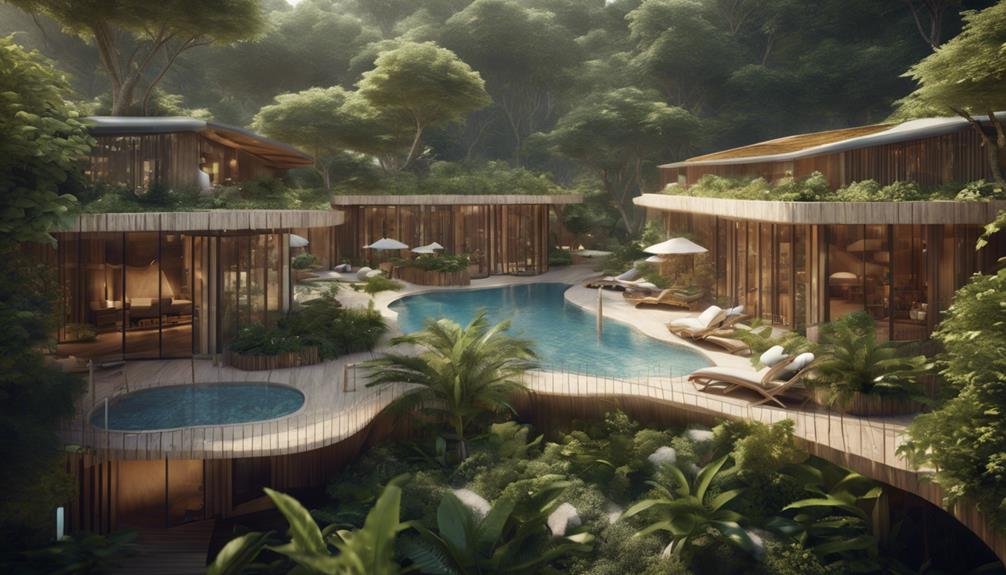Green Getaways: How Sustainability Is Reshaping the Hospitality Industry"
Sustainability is profoundly reshaping the hospitality industry, influencing everything from hotel design to guest experiences. Biophilic interiors, energy-efficient design, and eco-friendly amenities are becoming standard to reduce environmental impact. Hotels are actively engaging in community conservation efforts, showcasing commitment to sustainability. Green certifications not only validate eco-friendly practices but also attract environmentally conscious travelers. Leveraging technology for energy efficiency and embracing circular economy models are key trends driving sustainable operations. The industry's shift towards sustainability offers not only environmental benefits but also enhances the overall guest experience. Discover how these changes are shaping the future of hospitality.
Key Takeaways
- Sustainable practices in hotel design enhance guest experiences and reduce environmental impact.
- Eco-friendly amenities like green toiletries resonate with environmentally conscious travelers.
- Community engagement initiatives foster positive relationships and environmental stewardship.
- Green certifications validate dedication to eco-friendly operations and build consumer trust.
- Advanced technology like smart automation systems optimize energy consumption for sustainable operations.
Sustainable Practices in Hotel Design
In the world of modern hospitality, the integration of sustainable practices in hotel design is becoming an increasingly vital aspect of creating environmentally conscious and efficient accommodations. Two key elements that are revolutionizing hotel design are biophilic interiors and passive design strategies.
Biophilic interiors, which incorporate nature into the built environment, have gained popularity in the hospitality industry for their ability to enhance guest experiences, improve well-being, and reduce environmental impact. Incorporating elements such as living green walls, natural lighting, and indoor plants not only beautifies the space but also contributes to air purification and stress reduction for guests.
Passive design strategies focus on maximizing the building's natural resources, such as sunlight, shade, and ventilation, to minimize energy consumption and increase overall efficiency. Techniques like orientation to optimize natural light, well-insulated building envelopes, and natural ventilation systems help hotels reduce their carbon footprint and operational costs while providing a comfortable and sustainable stay for guests. By embracing these sustainable practices, hotels can create spaces that are both eco-friendly and aesthetically pleasing, setting a new standard for the industry.
Impact of Eco-Friendly Amenities
The implementation of eco-friendly amenities in hotel operations plays a vital role in enhancing sustainability efforts and guest experiences within the hospitality industry. By incorporating green toiletries and organic linens, hotels can greatly reduce their environmental impact. Green toiletries, such as biodegradable soaps and shampoos, help minimize the use of harmful chemicals and plastics, contributing to waste reduction. Organic linens made from sustainable materials not only provide guests with a luxurious experience but also support water conservation efforts by reducing the need for frequent washing.
Moreover, these eco-friendly amenities showcase a hotel's dedication to sustainability, resonating with environmentally conscious travelers seeking responsible accommodation options. Guests increasingly appreciate and expect hotels to prioritize sustainability, making eco-friendly amenities an important factor in attracting and retaining clientele. Ultimately, the integration of such amenities not only aligns with environmental goals but also enhances the overall guest experience, creating a win-win situation for both the hotel industry and eco-conscious travelers.
Community Engagement and Conservation
Community engagement and conservation initiatives are pivotal aspects of sustainable hospitality practices, fostering positive relationships and environmental stewardship within local areas. Hotels and resorts are increasingly focusing on wildlife protection through partnerships with local conservation organizations. These collaborations not only help in preserving biodiversity but also provide guests with unique opportunities to engage with and learn about local ecosystems.
Moreover, eco-conscious events organized by hospitality establishments contribute to environmental stewardship by promoting sustainability practices and raising awareness about conservation issues. By hosting events such as beach clean-ups, tree planting activities, or wildlife preservation workshops, hotels can actively involve guests in their conservation efforts, fostering a sense of responsibility towards the environment.
Through these initiatives, hotels not only demonstrate their commitment to sustainability but also create meaningful connections with the local community. By engaging in conservation projects and forming partnerships with local stakeholders, hospitality businesses can make a positive impact on the environment while enhancing the overall guest experience.
Advantages of Green Certifications
Fostering a commitment to sustainability through green certifications in the hospitality industry not only enhances environmental practices but also validates a business's dedication to eco-friendly operations. Green certifications offer a range of advantages, including cost savings and increased consumer trust.
One significant advantage of obtaining green certifications is the potential for cost savings. By implementing eco-friendly practices like energy-efficient lighting, water-saving fixtures, and waste reduction initiatives, hotels can significantly lower their utility bills. These cost savings not only contribute to the bottom line but also demonstrate a commitment to responsible resource management.
Moreover, green certifications help build consumer trust. In an increasingly eco-conscious world, travelers are actively seeking accommodation options that align with their values. By displaying green certifications, hotels signal to guests that they prioritize sustainability. This transparency fosters trust and loyalty among environmentally conscious consumers, ultimately attracting a more significant market share.
Technology for Energy Efficiency
Utilizing advanced technology for energy efficiency is a pivotal strategy for hotels seeking to reduce operational costs and minimize their environmental impact. Smart automation systems enable hotels to optimize energy consumption by automatically adjusting lighting, heating, and cooling based on occupancy levels and natural light conditions. These systems can also detect inefficiencies, such as equipment malfunctions or energy wastage, allowing for prompt intervention.
Energy monitoring plays a vital role in identifying patterns of consumption and areas where improvements can be made. By analyzing data from sensors and meters, hotels can pinpoint high-energy consumption areas and implement targeted solutions to enhance efficiency. Real-time monitoring empowers hotel management to make informed decisions regarding energy usage, leading to cost savings and a reduced carbon footprint.
Moreover, technology offers the opportunity to engage guests in sustainable practices. Mobile apps that control room settings and provide energy usage feedback can raise awareness and encourage guests to participate in energy-saving efforts during their stay. Embracing these technological advancements not only benefits the environment but also enhances the overall guest experience, positioning hotels as leaders in sustainable hospitality practices.
Future Trends in Sustainable Hospitality
As the hospitality industry continues to prioritize sustainability, future trends are pointing towards the integration of technology for enhanced energy efficiency and the adoption of circular economy models. These advancements are reshaping the way hotels and resorts operate, emphasizing the importance of innovative solutions that reduce environmental impact while meeting guest expectations for eco-conscious accommodations.
Embracing these trends will not only drive cost savings but also position businesses at the forefront of the sustainable hospitality movement.
Tech Integration in Sustainability
One of the key drivers shaping the future of sustainable hospitality is the increasing integration of technology to enhance environmental practices and operational efficiency.
The hospitality industry is increasingly turning to renewable energy sources like solar panels and wind turbines to power their establishments, reducing reliance on traditional energy grids and lowering carbon footprints.
Additionally, smart buildings equipped with advanced automation systems allow for more efficient energy consumption by adjusting heating, cooling, and lighting based on occupancy levels and natural light availability.
These technological advancements not only contribute to a more sustainable operation but also help in reducing costs for hospitality businesses in the long run.
As the industry continues to embrace tech integration, the future of sustainable hospitality looks promising with a focus on innovation and efficiency.
Circular Economy Models
With the increasing emphasis on technological advancements for sustainability in the hospitality industry, a shift towards circular economy models is emerging as a key future trend. Circular economy models focus on minimizing waste generation and maximizing resource optimization. By implementing these models, hotels and resorts can reduce their environmental impact while also improving operational efficiency. The table below highlights some key aspects of circular economy models in sustainable hospitality:
| Aspect | Description | Benefits |
|---|---|---|
| Waste Management | Minimizing waste through recycling and | Reduced environmental footprint |
| upcycling initiatives. | Cost savings | |
| Resource Optimization | Efficient use of resources such as | Conservation of resources |
| water, energy, and materials. | Enhanced sustainability practices |
Conclusion
To sum up, the hospitality industry is evolving towards sustainability, with hotels implementing eco-friendly practices and engaging in community conservation efforts.
This shift is akin to a blossoming garden, where each green initiative acts as a vibrant flower contributing to the overall beauty and health of the environment.
As technology continues to advance, it is clear that the future of hospitality lies in embracing green practices for a more sustainable and responsible industry.







